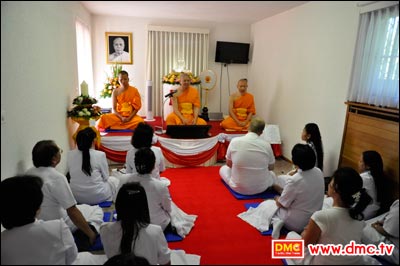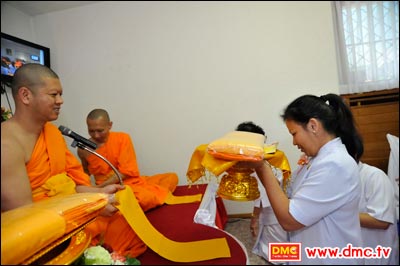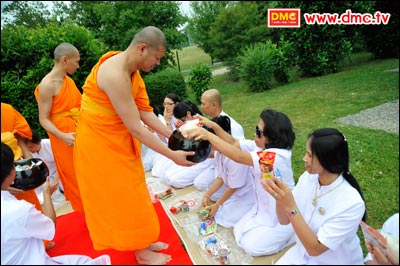Meditation
Meditation for Peace
The Sight of a True Monk#2
Listen to his teaching: attentively listening to Dhamma teaching of the true monk.
The practicality of receiving a full benefit of seeing a true monk
1. Associate with him: find as much opportunities as possible to visit the true monk to learn the knowledge of Dhamma from the true monk.
2. Offer requisites: help release the daily burden of the monk such as cleaning the place and offering him the requisites, os that the true monk can have more time to teach Dhamma. That the true monk can have more time to teach Dhamma.
3. Listen to his teaching: attentively listening to Dhamma teaching of the true monk.
4. Memorize his teaching: Memorize his graceful conducts and Dhamma teaching. Always review and consider on his Dhamma teaching.
5. Reflect on his teaching: always reflect on his teaching and his virtue of conduct with your wisdom and thought and try to follow his practice with endeavor.
Why the householder likes to have a true monk visiting their home
If the householder offers proper hospitality to a true monk with a purified mind presence; such hospitality can bring five distinct merits to the householder:
1. Looking on him with respect:
Will bring stead fast faith in mind because seeing the conduct of the true monk will give that household the chance to practice the path to heaven.
2. Offering appropriate hospitality:
Giving the true monk a place to sit (asana) will give the householder the chance to practice the path to be reborn in a noble family.
3. Putting aside the impurity of the mind:
Especially the stinginess. By offering refreshment for a true monk to drink for example, gives the householder the chance to practice the path to attain honor.
4. Offering him requisites:
Sharing their wealth with the true monk (e.g. by offering a donation to a true monk ) gives that holder the chance to practice the path to attain wealth.
5. Conversing on the Dhamma:
Conversing on the Dhamma and listening to the teachings gives the household the chance to practice the path to attain inner wisdom.
Proper manners when interacting with a true monk
Proper manners when interacting with a true monk
1. Offer any requisites suitable for the monks to use.
2. If there is no suitable requisites available then bow to the monk using the five – point bow to express your respect.
3. Join your hands in a gesture of respect: If it is not convenient for you to bow then join your hand in a gesture of prayer to pay respect to the monk.
4. If it is not convenient for you to join yours hands in a gesture of respect, at least stand respectfully or find some other way of expressing your respects such as make way for him to pass.
5. Even if you cannot do any of the above at least look at the monk with fait and respect.
Illustrative Tales of benefits of seeing a true monk
Venerable Sariputta was originally named Upatissa when he was a noble son in a wealthy family. He first studied the mundane knowledge and had achieved eighteen diplomas. After he had finished all the mundane knowledge, he decided to pursue Mokkhadhamma (Dhamma that helps people to get free from defilements and sufferings)
He ordained and became an ascetic in the school of Sanjaya Velatthaputta. The Dhamma of the Lord Buddha was not available in this school, so even though he finished all his knowledge from this abbey, he still lacked the knowledge of an end of defilements, so he made a journey to search for an Arahant to study the Dhamma of the Lord Buddha.
Later, Venerable Sariputta met an Arahant called Venerable Assajji who was going on his alms reund. Veneralke Sariputta was impressed by the graceful conduct and the peacefulness of Venerable Assajji, so he accompanied Venerable Assajji and helped setting up the table for the meal. He waited until Venerable Assajji finished his meal, then approached Venerable Assajji and bowed in respect before saying,
“Sir, you have a graceful appearance, radiant complexion, to whom did you dedicate your merit of the ordination to ? Who is your master? Whose Dhamma do you observe?”
Venerable Assajji replied, “I am ordained in the school of Gotame Buddha who is the son of the Shakya kings. I am observing the Dhamma of The Gotama Buddha:
“And what what does your master teach, Sir?” Venerable Sariputta asked.
Venerable Assajii replied that “I am still newly ordained, and I am still newly to the teaching of the Buddha, I am not able to elaborate much on the Dhamma teachings, but I can tell you that “Every thing arises because of a cause, the Tathagata(Lord Buddha) will show the cause of that arising and the falling away of that thing”
Despite of the shortness of the sermon, venerable Sariputta was able to reflect onit and could attain Sotapanna (Stream-Enterer) at that place.
Would the householder have listened to the Dhamma Venerable Assajji expounded, they might not have fully understood and not been able to captivate the Dhamma being given. This si because in many past lives they had already seen many Buddhist monks, but did not really pay attention to them. They did just see them with their eyes but did not reflect upon with the mind and had not yet seen through the virtues of the monk with the vision of truth.
Inspires us to follow the good manner and conduct of the true monk.
But Venerable Sariputta was more extraordinary than the house holder; He had seen many Buddhist monks in many past lives. He did not only physically see the monk, but he always thought through and saw throught the virtues of the monk and tried to reflect until he understood the Dhamma expounded by the monk. So in this life, after he had listened to only the brief Dhamma expounded by Venerable Assajji, he became Sotapanna. This is the merit retribution of seeing a true monk fro the past and present life.
Focused on the virtues of the two great persons we can see that Sariputta was a tactful person. He first took care of Venerable Assaji until Venerable Assaji had finished the meal before beginning the Dhamma conversation with Venerable Assaji.
Venerable Assaji was a person of great humility. Even though he was an Arahant he was still humble himself as anewly ordained monk, now to the teachings of the lord Buddha. Thus, he found himself not to be able to elaborate much on the dhamma teachings and therefore was able to give only a brief explanation.
Therefore, everybody who thinks to be very talented, capable any is boasting should ask themselves if they are really capable of it and possess those great virtues.
Everybody should practice and fully cultivate these virtues and be humble like Venerable Assaji. We should always be respectful when seeing a true monk like venerable Sariputta did.
The Benefits of seeing a true monk
1. Males us aware of our responsibilities to cultivate meritorious deed.
2. Inspires us to follow the good manner and conduct of the true monk.
3. Enables us to have the right view and greater wisdom in way of life.
4. Becomes a non-recklessness person.
5. Seen as a person who fully pays homage to the Triple gems.
6. Enables us to attain the threefold treasure: Mundane treasure, Celestial treasure and Nirvana treasure.
7. Enables us to attain the path and fruits of the Nirvana.
Meditation - Related Articles
" />
" />
" />
" />
" />
" />
" />
" />
" />
" />
" />
" />








